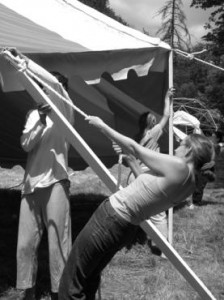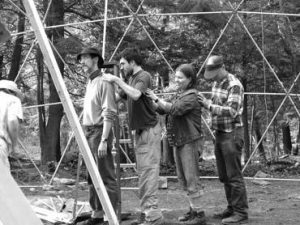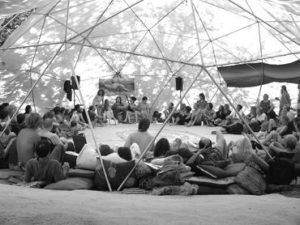By Melanie Rios, Michael Rios, Sarah Taub, and Pati Diehl
Melanie: During my first day or two at Network for a New Culture Summer Camp in 1999, I felt uncomfortable, and labeled the experience “false intimacy.” Here I was, gazing into the eyes of a stranger for far longer than seemed proper, laying my hand over a stranger’s heart, and listening to our group leader ask us to imagine sending love to this person. Whoa! I feared for what might come next, since normal boundaries had been set aside. But the funny thing was, by the end of camp, after sharing this and many other experiences with a hundred other campers, this same type of exercise created in me a feeling of authentic and safe intimacy, a deep feeling of love for these particular people and for humanity in general. I wondered what had happened in these ten days to bring about this transformation. Would this sense of overflowing connection persist after camp was over?
At Network for a New Culture (NFNC) camps, currently located in Oregon, West Virginia, and Hawaii, adults come together to learn about and practice ways of living together different from the norms of mainstream culture, experimenting with new ways of relating to themselves, to their work, to others, and to the world. Workshops and other activities encourage participants to explore intimacy, freedom, and radical personal responsibility, with the goal of fostering the personal empowerment and emotional resilience that would allow a cooperative, nonviolent culture to emerge. The strong relationships that form at camp create the basis for a vibrant community all year long.
Intimacy and Transparency
At NFNC camps, intimacy isn’t just another word for sex; it’s about “transparency,” being truly open about who we are and what we want. This begins with honest self-reflection, asking ourselves about what we are really feeling and thinking, even if the answers embarrass us. At one opening session, a couple told us what their spoken dialog might have been when they first met each other, along with their internal dialog. “Hello,” said the man; then to himself he said “Wow, I love her outfit, and her smile. I wonder if she’s single? Does she notice the zit that popped out on my face this morning?” It was an amusing skit that encouraged us to look at our own internal dialogs as we met each other.
Charla: I found it relaxing to live in a community where you didn’t have to pretend you were feeling great all the time. At first, I thought I’d be expected to hug everyone all the time. Not so. The hugs I gave were from the heart, not the mind. They started deep in the body and I felt I was “at choice” all the time. I could live the rainbow of my emotions without embarrassment or shame. I could reach out or withdraw according to my own rhythm. I learned to give myself empathy, and to feel respected by others.
The norm at camp is to share freely with others what we are thinking and feeling—while always being “at choice.” One way that this transparency is practiced is the ZEGG Forum (not related to Landmark Forum). It is a listening circle to which we can bring problems, achievements, and issues, or just show ourselves to the community. People take turns walking around in the center while talking about what’s true for them in that moment. A “Forum leader” sometimes walks alongside this person to deepen the sharing, or to encourage them to more dramatically express themselves. While the goal of the forum is simply to share rather than to solve problems, often shifts occur simply as a result of understanding each other.
Sarah: When W. arrived at camp, he was angry about the work shifts he had been assigned. As work coordinator, I had a poor first impression of him; he was socially awkward and did not make eye contact. A few days later, he got up in Forum. He shared with the group his longing to connect with others in a loving way, and his lifelong inability to do so. He had been angry about his assignments because they conflicted with a workshop that he desperately hoped would be able to help him. Because of this sharing, I was able to see him as a loving spirit with a difficulty in perceiving and responding to social cues. During camp clean-up, I had the privilege of having him as my work partner; it was one of the most harmonious shared work experiences I’ve ever had.
Camp organizers, who are all volunteers, try to model this transparency, openly sharing issues that come up between them. At the second NFNC camp, held in 1996, conflict broke out among the organizers:
Miaya: I was mortified that our dirty laundry was being aired so publicly. Things heated up so high that, in one Forum, my brother offered an “old culture” invitation to my partner to step outside and slug it out. Surprisingly, the feedback that we heard from the campers was mainly appreciation for our openness to share so much of our discord and angst, and willingness to look like fools. There were many hurt feelings among the organizers during that second summer camp, but, in the end, we all knew we had just had a beautiful trial by fire.
A “Fishbowl” structure provides another opportunity for participants to practice transparency. The campers are divided into two groups, such as parents and childfree adults, men and women, or straight and queer. One group sits in the center and speaks among themselves while the other group listens in silence.
Melanie: I remember one time listening to men talk about their experiences with impotence. It was like being a fly on the wall of a men’s group, and I felt my heart expanding with compassion.
“Seven-Minute Dates” are another format that fosters people getting to know each other at camp. People partner with someone for a short time to discuss a topic offered by the group leader, such as “Was it easy for you to make and keep friends when you were younger?”
Bodhi: Cuddled face-to-face with a new friend, I shared my past struggles with being socially acceptable—the enormous effort of pretending to be “normal” when inside I felt very much the stranger in an increasingly strange land.
There’s playfulness as well—the kids at camp aren’t the only ones who get to have fun. Campers keep on the lookout for pretentious or spoofable moments, and there are plenty!
Camper: I know that it’s not the time for lost-and-found announcements—but could someone help me? I can’t find my chakras!
Freedom of Choice and Personal Responsibility
One mainstream norm that is challenged is monogamy as the only option for responsible sexual relationships. At camp, all loving relationship styles are honored, including celibacy, monogamy, and open relationships such as polyamory. Workshops offer guidance on creating fulfilling romantic relationships. In one workshop, participants practice asking for what they want while respecting each other’s boundaries. A camp aphorism is that “It’s okay to ask if it’s okay to hear ‘no.’” We find that “no” is the most intimate thing you can hear from another human being—because if you can receive their “no,” you can trust their “yes.”
Sometimes campers have strong feelings, such as embarrassment, or anger, or jealousy; they are encouraged to feel their feelings fully, while letting go of demands and expectations they have for others. As always, each one is always “at choice.”
Living in a culture that is truly “at choice,” while practicing radical personal responsibility, can be startling when someone first arrives. At a workshop, one person may come a half hour late; another is lying on the floor, apparently asleep, just a few feet from the presenter; another gets up to leave halfway through. Since none of these activities directly interferes with others’ participation, no notice or offense is taken.
Likewise, camp is clothing-optional; and this reflects the real meaning of “at choice” as well. People are free to wear whatever they choose—or not. The usual result is that a few campers are actually nude, about a quarter are not “street legal” in some way, and the rest are covered to a more-or-less conventional degree. Clothes are for costume or comfort, not emotional protection.
First-year camper: It felt like I had a gym membership with a special focus on the muscle group of “choice” and “choosing.”
Experimenting with New Ways of Being
Experimentation is at the heart of camp. Rather than offering a set of “solutions” for personal and social problems, the emphasis is on developing the skills and the willingness to try new things, and sharing the results with other campers. People often try out new identities or behaviors that might feel unsafe in the mainstream world.
One person who attended camp for several years seemed painfully shy. One day, some campers asked if he’d be willing to try an experiment. They brought him to the camp costume closet, and dressed him up by pinning red hearts on his white shirt and giving him a red cape and white leotards to wear. They coached him on how to stand up tall and smile with confidence. Then they introduced him to everyone at the morning circle as “Passion Man,” and requested that he warmly hug everyone he met for the remainder of that day who was willing to play this game. He enthusiastically hugged people that day and for the rest of camp, even after returning to his normal clothing.
During the past few years, one new way of being that many men have explored is becoming more comfortable expressing physical affection with each other. The women from the early years were good at cuddling and hugging people of all genders, and all campers understood that cuddling with another person didn’t necessarily mean sex was available, or even of interest. But the men in the early years of camp seemed to be afraid of touching each other.
Michael: By 2002, another man and I decided it was time to change things. In a men’s meeting, we stood up, moved to the center, and cuddled each other—and invited the others to do the same. One by one, each man moved toward the center, touching, then later cuddling with each other. In 2003, my friend and I got together ahead of time to figure out how to make the same point that year. We got to the men’s group slightly late, and found the entire group was already one giant cuddle pile!
Owning Our Sexuality
Sexuality is dealt with openly at each camp. There are workshops on erotic energy, safer sex, sexual healing, and more. Over the years, because of an atmosphere of openness, much of the charge on this topic has dissipated, and many campers discuss their sexual concerns and delights much the way they would talk about any other part of their lives.
Camper: I was raped when I was a teenager. Since then, I have had relationships only with women. I felt safer at camp than I had ever felt before, so I asked a man to help me be sexual with men again; he agreed to proceed slowly and gently, with time to feel all my feelings and to stop completely if I said so. Afterwards, I shared this with the women’s circle, who celebrated with me in reclaiming this long-lost area of my sexual power.
Presenters and Workshops—Learning Together
Each year, camp has presenters on topics meant to educate or inspire the community. Campers aren’t expected to agree with the presenters; they take what works for them, and leave the rest—or challenge the presenter. When things go “wrong,” we get to practice what we are learning at our workshops. People at our events are encouraged to use upsets and painful reactions as gateways to personal growth and deeper intimacy.
Sarah: During a playful exercise, pretending to be animals on all fours, a man nipped my heel. In a panic, I slapped his back and yelled “Don’t do that!” He apologized immediately. The workshop leader asked us to share what happened; but in the process, he told me that slapping the man’s back was a violent act, and asked me to apologize. I refused. There was intense reaction among the group; some felt that violence is never appropriate, and others were horrified that a woman was being told that she was wrong to counter a physical assault. The leader continued to loudly defend his position. People gathered in informal small groups to provide support for each other, and to explore what had happened.
The next morning, after talking with many campers, the workshop leader told me that he had learned a lot from all the ensuing discussion, and apologized. He then went before the whole group, and shared his own process and new understandings; that he had reacted from his own triggers around violence, and especially being in the position of the workshop leader, had unfairly used his position of authority in front of the group. The leader and I wound up with a warmer and deeper connection, sensing a mutual commitment to communicating from the heart.
First-year camper: The dialog that followed that event was the moment I knew this community was different. It was committed to dealing with things as they came to us and not sweeping things under the rug.
Going Home—What Now?
Even after camp is over, many participants find that what they learned at camp carries over into their “real world” life. Some of the organizers have joked that the success of camp should be measured by the number of people who go home and quit their soul-destroying jobs.
Jade: I came to Summer Camp East for the first time this year, mostly on a lark. My response to the experience was so intense that I took another two weeks off work to attend Summer Camp West—just to see if it was all real. When I returned, I walked into my manager’s office and told her that I cannot continue to spend 45 hours a week in a building where windows do not open. I related my Summer Camp experience and thoughts in detail and she told me to consider the path of a healer or a teacher. Since then, my company has agreed to make my job part-time and telecommute, and I have moved to a New Culture intentional community 250 miles away.
Several land-based intentional communities have been inspired by the Summer Camp experience, including Heart-On Farm in Oregon, La’akea in Hawaii, and Chrysalis in Virginia.
Melanie: The communication skills and life attitudes I learned at camp have increased my ability to connect with my family and friends at home in an honest, loving manner. Inspired by what I found at camp, I moved to Oregon and co-created an ecovillage in Eugene using those principles and insights. Many former campers live in Eugene, and I’ve deepened those friendships as well. Even though the romantic connections among these folks may come and go, the friendships mostly remain steady, creating a tribe of people who love and support each other.
Besides the tribe in Eugene, there are several others that have grown out of camp; people who connect with each other frequently, even daily, who consider themselves part of an intentional community, even though they don’t share the same address.
The Authors: We’re excited to be part of an intimate community that explores personal growth, intimate relationships, sexuality, communications, community, social change, and global consciousness, all while trying to find practical ways to “bring it all home.” What we have learned is that personal growth is not enough; the change needed for human survival cannot happen piecemeal. Our new understandings can be most effectively implemented in the larger society by changing our culture, our customary ways of thinking and acting. The core insight of New Culture is that powerful change comes first to our daily lives.
Excerpted from the Spring 2009 edition of Communities (#142), “Festivals and Gatherings.”



